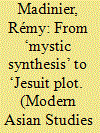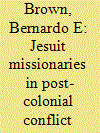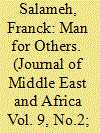|
|
|
Sort Order |
|
|
|
Items / Page
|
|
|
|
|
|
|
| Srl | Item |
| 1 |
ID:
193601


|
|
|
|
|
| Summary/Abstract |
Since the 1990s, Indonesia has been confronted with the growing influence of a radical Islamist movement that challenges the state doctrine (Pancasila), which was adopted in 1945, and demands a greater place for Islam, which is the religion of nearly 90 per cent of the population. The hardline groups wish to call into question the Indonesian state’s pluralistic and inclusive religious identity, which they see as a conspiracy hatched by the Christian minority to deprive the Muslim majority of its ostensible rights. The Society of Jesus, which has been present in Java since the nineteenth century, is considered by Islamist critics as the main architect of this alleged plot. Furthermore, one of its members, Father Josephus Beek, is presented by Islamist radicals as one of the founders of the New Order (1966–1998), the regime led by General Suharto which was very hostile to political Islam in its early days. This article analyses how the Society of Jesus was able to integrate Catholicism into the Javanese spiritual landscape and explores the subsequent roles played by Jesuit leaders in the genesis and defence of Pancasila. It also sheds light on how Josephus Beek’s very real manoeuvres have provided fodder for militant Islamist circles seeking to delegitimate Indonesia’s secular status quo.
|
|
|
|
|
|
|
|
|
|
|
|
|
|
|
|
| 2 |
ID:
142831


|
|
|
|
|
| Summary/Abstract |
In August 1990, Father Eugene John Hebert SJ disappeared while trying to reach his home in the Sri Lankan city of Batticaloa. Caught in the midst of the turmoil that confronted Tamil and Muslim minorities after the peace-keeping operations led by the Indian armed forces collapsed, Father Hebert was one of thousands of victims who perished in the violence that engulfed the Eastern Province of Sri Lanka between June and September 1990. Since the early stages of the ethnic conflict (1983–2009), American Jesuits stationed in Tamil-speaking areas of the island had become de facto human rights activists, being virtually the only remaining trusted mediators between the different factions involved in the armed confrontation. Their efforts to foster peace and dialogue in the region were far from their original assignment as educators—which Father Hebert had been conducting since his arrival in 1948. This article not only traces Father Hebert's life trajectory from Louisiana to Sri Lanka, it also reflects on the cultural impact that the presence of American Jesuits had in the entire region, as well as on the changing responsibilities they assumed in the volatile political context of the island that took them from coaching basketball to becoming catalysts for peace.
|
|
|
|
|
|
|
|
|
|
|
|
|
|
|
|
| 3 |
ID:
161162


|
|
|
|
|
| Summary/Abstract |
The mere mention of Henri Lammens, Society of Jesus (SJ), provokes unease, notorious as this militant “priest-scholar” has become in postcolonial circles. Yet his failings notwithstanding, Lammens has been a victim of the academic conceits and biases of postmodernist postcolonialists through whose prisms he often emerges as a cantankerous, inflammatory, Christian polemicist, hell-bent on defaming an otherwise blameless, innocent, beatific Islam. This article suggests that a more nuanced gaze be cast at Henri Lammens, the man and missionary, before judging his scholarship; a corrective of sorts, shedding light on the life and times of a Belgian boy, who traveled East at the tender age of fifteen, who fell into the snare of Near Eastern Christians, and who set out to write their history and restore their suppressed memories—doing so not without the passion and affection of the neophyte.
|
|
|
|
|
|
|
|
|
|
|
|
|
|
|
|
|
|
|
|
|